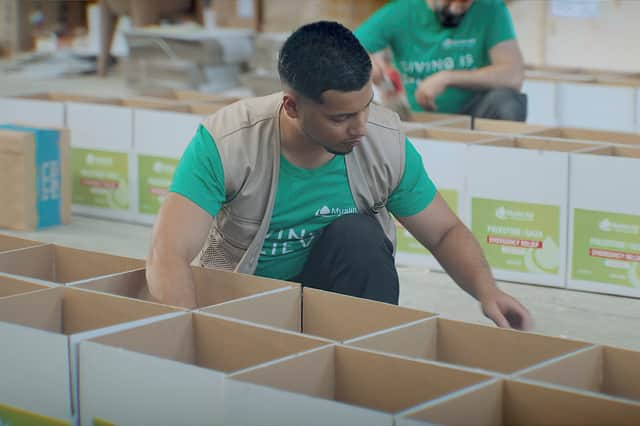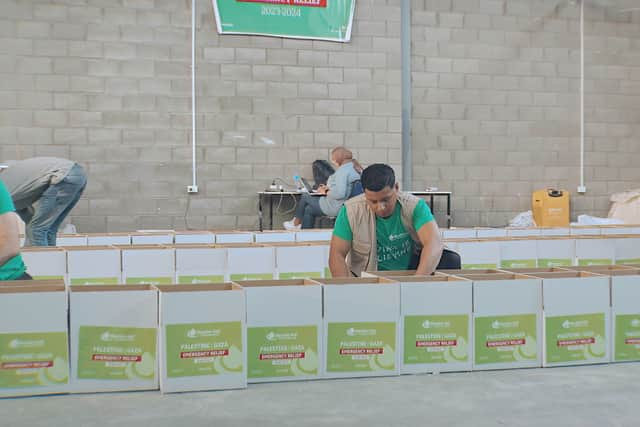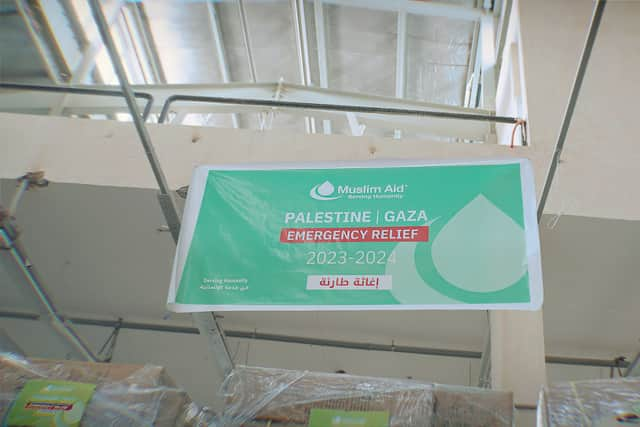Gaza: 'The scenes are desperate' - London aid worker returns from border
and live on Freeview channel 276
A humanitarian aid worker who returned from the Rafah border crossing between Gaza and Egypt last weekend has described the situation in the region as “desperate”.
Muslim Aid UK philanthropy and partnerships manager Yusuf Kalam was part of a team of seven delivering food, water, medical assistance and temporary shelter at the Rafah border between December 4 and 9.
Advertisement
Hide AdAdvertisement
Hide AdDuring the visit, Kalam heard of the death of his colleague Eman Abu Saeid, who worked for the Tamer Institute for Community Education, a non-governmental organisation and partner of Muslim Aid UK, based in Palestine. She was killed with 22 members of her family, including husband Iyad and two children Judy and Ziad.
In a statement, her colleagues at Tamer described her as “a woman with the biggest heart that fits all children and adults in Gaza and the entire world”.
Kalam said the group lost contact with Saeid and had tried to reach her relatives for several days before hearing the family had died.
Saeid had provided support to children and families across the Gaza Strip and was planning a project to take orphans and children to the beach to teach them about the sea and make decorations out of seashells.
Advertisement
Hide AdAdvertisement
Hide Ad“She wanted to provide respite from the violence and connect them with the history of their home,” Kalam said. “Now she’ll never be able to do that. It’s a devastating story.”


More than 20,000 people have been killed in Gaza, according to Hamas, and at least 52,000 injured in Israel's military response to the terrorist attacks of October 7, in which more than 1,100 people were massacred and hundreds were taken hostage.
The Muslim UK group was able to authorise ambulances, trucks of food, medicine and water tanks across the border during its visit. Kalam warned that hunger is a major concern in the area.
He said: “People are defecating on the streets, people are looting some of the aid trucks and families are going hungry. The new war is the war on hunger.”
Advertisement
Hide AdAdvertisement
Hide AdAn assessment by the United Nations World Food Programme found that nine in 10 people in Gaza reported spending at least 24 hours without food, with more than a fifth doing so for more than ten days in the past month.
It called for the opening of all border crossings to meet demand for emergency supplies.


The United Nations Office for the Coordination of Humanitarian Affairs (OCHA) estimates that up to 1.8 million people in Gaza are internally displaced.
“These are huge numbers without humanitarian intervention - it’s a huge risk of loss of life,” Kalam said.
Advertisement
Hide AdAdvertisement
Hide AdWhile queueing for the border, Kalam met an elderly woman who had been evacuated from Gaza but was separated from her daughter.
“She said it was the worst situation she’s ever been in and that she can’t remember a situation as catastrophic,” he said. “It’s a feeling of helplessness and the scenes are desperate. Families can’t get in touch with their loved ones - it’s very traumatic.”
Medical equipment and other provisions were procured by the group from Cairo and neighbouring cities, a list of which was then sent to the Egyptian authorities for pre-approval.
“Once that’s given the green light we’re allowed to send it across towards the Rafah border where there is a massive backlog of trucks waiting to get in,” Kalam said, describing 12-hour queues. “There are around 10 checkpoints to make sure nothing has been altered or added to the trucks. Then there’s a wait for that to be processed, screened and delivered through the Rafah border."
Advertisement
Hide AdAdvertisement
Hide Ad

Kalam said the time to reflect while waiting to reach the border gave him a sense of hopelessness - but also gratitude.
“We had the time to just wait, to eat and to pray. People across the border who are running for their lives don’t have that luxury and opportunity."
Muslim Aid UK has been operating in Gaza for the past 17 years and says it has provided over £14 million-worth of humanitarian aid and built 61 solar power water units in the area.
Kamal believes that only two of these units remain standing, the rest destroyed.
Advertisement
Hide AdAdvertisement
Hide AdHe said Muslim Aid UK is hoping to send out another team to the Gaza strip by the end of the year to oversee the charity’s next phase of intervention in the event of a ceasefire.
The United Nations Security Council has adopted a resolution calling for more humanitarian aid for Gaza, but falling short of calling for an immediate ceasefire.
Speaking before the resolution, Kalam said: “We’re hopeful that if a pause takes place, we can work towards rebuilding Gaza as an entity by providing homes, rebuilding some of the key infrastructure, supporting hospitals and providing psychosocial support to the people of Gaza."
He called for Londoners to “write to their local MP to demand a ceasefire and allow humanitarian corridors to open so that aid organisations can deliver life-saving intervention”.
He encouraged donations to Muslim Aid UK so that the charity can continue to provide food parcels, clean water and medical assistance.
Comment Guidelines
National World encourages reader discussion on our stories. User feedback, insights and back-and-forth exchanges add a rich layer of context to reporting. Please review our Community Guidelines before commenting.